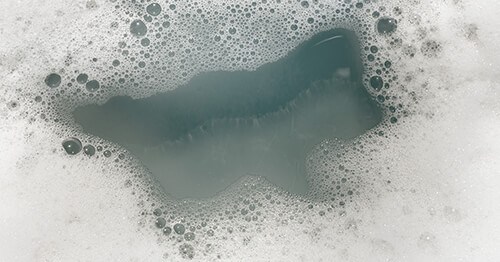We've stumbled on this great article relating to What to Do if Sewage Starts Coming Up Through Your Bathtub below on the internet and accepted it made perfect sense to discuss it with you on this page.

Sewage back-up in the tub can be a traumatic and unhygienic issue for any type of property owner. Not only is it inconvenient, but it additionally presents major health threats and indicates underlying concerns with the plumbing system. Comprehending why sewer is turning up via the tub is vital for taking suitable activity to deal with the trouble efficiently.
Intro to the Concern
Recognizing the Issue
When sewer starts backing up into the bath tub, it's a clear indication of an issue with the drainage system. The wastewater that must be moving away from your home is instead discovering its way back right into your living space, which can cause substantial damages and carcinogen.
Possible Reasons
A number of aspects can contribute to sewage back-up in the bathtub. From blockages in the sewer line to issues with the plumbing infrastructure, recognizing the root cause is necessary for finding an option.
Typical Factors for Sewage Backup
Blockages in the Sewage System Line
Among the most typical causes of sewage back-up is a clog in the sewer line. This can take place because of the build-up of debris, grease, or foreign items in the pipelines, protecting against proper flow and causing sewer to support into your bathtub.
Tree Root Breach
Tree origins seeking moisture and nutrients can penetrate sewer lines via small splits or joints. With time, these roots can grow and expand, causing significant damage to the pipes and resulting in sewer backup issues.
Aging Infrastructure
Older homes may have obsoleted plumbing systems that are more at risk to corrosion, cracks, and wear and tear. As pipelines age, they end up being more susceptible to leaks and clogs, enhancing the likelihood of sewer backup occurrences.
Heavy Rainfall or Flooding
During durations of heavy rainfall or flooding, the drain system may come to be overloaded with excess water, creating back-ups and overflows. This can cause sewer backing up into bathtubs and other components inside the home.
Health Risks Related To Sewer Back-up
Contamination of Water
Sewer back-up can pollute the water supply in your house, posing a serious health risk to you and your household. Direct exposure to infected water can bring about stomach problems, skin infections, and other illnesses.
Spread of Illness
Sewage has hazardous microorganisms, viruses, and parasites that can create a range of conditions, including liver disease, cholera, and gastroenteritis. Coming into contact with sewer or polluted surface areas puts you at risk of infection.
Mold and mildew Development
Wetness from sewage backup can develop perfect conditions for mold growth in your house. Mold spores can exacerbate respiratory system issues and create allergic reactions in sensitive individuals, making prompt clean-up necessary.
Indicators of Sewer Backup
Foul Odors
Undesirable odors rising from drains pipes or components, particularly in the shower room, might show sewer backup concerns. These odors are typically strong and relentless, signifying a trouble that requires instant interest.
Slow Draining Fixtures
Tubs, sinks, and commodes that drain pipes slowly or otherwise at all could be experiencing sewage backup. If several components are affected at the same time, it's most likely that the concern originates from an usual point, such as the main drain line.
Gurgling Sounds
Weird gurgling or gurgling sounds originating from drains when water is running somewhere else in your house are a sign of air entraped in the plumbing system. This air build-up can arise from sewage backup and ought to be examined without delay.
Immediate Actions to Take
Turning Off Water
In the event of sewage backup, it's vital to turn off the water to stop further contamination and damages. Locate the major water shutoff valve in your house and shut it off till the issue can be dealt with.
Speaking To an Expert Plumber
Handling sewage backup is not a do it yourself job. Get in touch with a licensed plumber with experience in managing sewage-related concerns to analyze the circumstance and execute necessary fixings or clean-ups.
Preventing Contact with Polluted Water
Till the sewer backup is fixed, stay clear of contact with contaminated water to avoid the spread of microorganisms and virus. Use safety equipment if you must be in the afflicted area and clean your hands extensively afterward.
Preventive Measures
Regular Maintenance of Drain Lines
Arrange routine assessments and upkeep of your drain lines to determine and attend to prospective problems before they escalate into major troubles. This can consist of clearing out debris, examining for tree root intrusion, and fixing any kind of damaged pipes.
Setting Up Backwater Valves
Take into consideration setting up bayou shutoffs in your plumbing system to avoid sewage from flowing back right into your home during durations of heavy rainfall or flooding. These valves instantly close when water starts backing up, protecting your residential or commercial property from contamination.
Proper Disposal of Family Waste
Avoid flushing anything aside from toilet paper and human waste down the bathroom to prevent blockages and clogs in the sewer line. Dispose of grease, oil, and various other house chemicals correctly to lessen the threat of plumbing troubles.
Cleaning Up After Sewage Backup
Sanitation Procedures
Extensively decontaminate and sanitize affected areas after sewage backup to remove unsafe microorganisms and protect against mold and mildew development. Use suitable cleaning items and safety gear to guarantee safe and reliable clean-up.
Reconstruction of Influenced Areas
Fix any damages to floor covering, wall surfaces, or components triggered by sewage backup. Depending on the degree of the damage, you may need to change carpets, drywall, or other materials to recover your home to its pre-loss problem.
Why Is Water Backing Up in My Bathtub When I Flush My Toilet?
What to do about a sewer line clog
First, don’t bother with plunging. No amount of plunging will dislodge the clog in a sewer line. The clog is too far away. Plungers are for clogs in the toilet itself, not the sewer line. Plus, the most likely causes of a sewer clog are:
Tree roots Flushed toys or feminine products Grease buildup Those items don’t move easily. And in the case of tree roots, the roots need to be cut out of the pipe and the pipe will need to be repaired.
You’ll need a closet auger. A closet auger is a type of plumber’s snake with a protective cover to keep from scratching the delicate porcelain toilet. If the clog is further down, you may need to remove the toilet or use one of your cleanouts to get to the clog.
We also recommend doing a video inspection of the drain to ensure that the cause of the clog has been completely removed. Otherwise, you could have the same problem again in a few days or weeks.
https://mspplumbingheatingair.com/blog/why-is-water-backing-up-in-my-bathtub-when-i-flush-my-toilet

Hopefully you enjoyed our topic about What to Do if Sewage Starts Coming Up Through Your Bathtub. Thanks so much for taking a few minutes to browse our piece. For those who liked our page plz do not forget to pass it around. Thanks for your time spent reading it.
Schedule Appointment Now